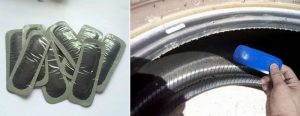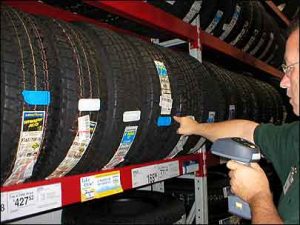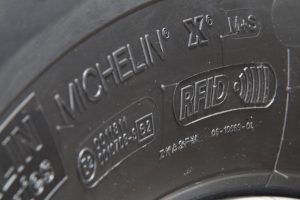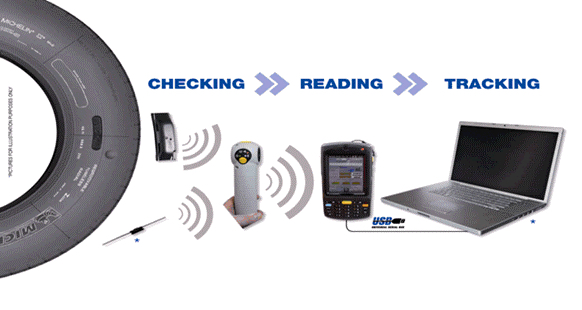Tires are supposed to leave tracks – not track us.
Someone should tell the tire companies. Who aren’t telling us about the tracking devices they’re embedding in the tires they’re selling to us – and which can be used to keep track of our comings and goings without our even knowing about it, much less having consented to it.
The devices are called Radio Frequency Identification (RFID) tags – chips, really. They are extremely small buggers – about the size of a grain of rice or even smaller than that – and have been in general use since at least the early 2000s for what is blandly styled Automatic Identification and Data Capture. Which means that wherever the chipped item, animal – or person – is or has been or is going can be kept track of automatically and in perpetuity.
The chips are activated by scanners – and so don’t need an internal power source, such as a battery – which would eventually die. The chip can therefore remain active – or rather, capable of activation (and tracking) for years, possibly decades.
Ostensibly, they are used for inventory tracking.
That’s not the objectionable part. A tire manufacturer has every right to keep track of its tires while they are in the warehouse, or on their way from the warehouse to the retailer – and while they are on the retailer’s shelves. Because at this point, the tires are still the property of the tire company, or the retailer.
But once you buy the tires, they become your property – at which point the manufacturer of the tire (and the retailer who sold you the tire) loses all rights to the tire, including the right to track the tire, or use the tire to track you. 
At the moment of purchase – of transfer of ownership – the RFID chip in the tires ought to be rendered automatically inert, so they can no longer be used to keep track of your tires. Or your comings and goings. Unless you specifically agree otherwise.
But the tire companies – and this includes almost all of the major players (more here) such as Michelin, Continental, Cooper, Bridgestone and Pirelli – are not even letting their customers know the tires they just bought are chipped, much less offering to zap the chips before the car leaves the shop.
This isn’t inventory control.
It is control.
Which is why they don’t tell you about the chips – much less offer to zap them into inertness. There is so much data to be captured, you see.
Automatically.
Profitably.
The data being collected – and sold – is currently worth an estimated $8-9 billion, on track to double by 2026. It is of great value to various interested parties to know your driving habits.
The insurance mafia, for instance.
Chipped tires could work (and perhaps already do work) as a way to keep the mafia informed of the miles you drive, as well as when, where and how those miles are accumulated – the better to profile you. Presumably, the chipped tires could also transmit data about speed as well. All sorts of things.
But it’s not just the insurance mafia (more about them here).
Knowing your habits, where you go – and when – as well as how long you stay and where you stay – also makes targeting you with ads and offers tailored to your habits and inclinations that much more effective, that much more profitable. Think Minority Report, the dystopian (but accurately predictive) 2002 Tom Cruise movie, based on the novel by sci-fi author Phillip K. Dick. Wherever you go, the ads follow you – are tailored to you.
And we’re not being cut in for so much as free cup of coffee the next time we buy a set of tires.
And that’s the rub – or at least, one of them.
RFID technology – like any technology – isn’t evil in se. It is how it’s used that makes it evil. Those who use it against us without our knowledge and consent are evil in the same general way that a person who uses a gun to rob people is evil. In the same way that person who cheats or embezzles money is evil.
If the tire companies who embed RFID chips in the tires they make for purposes of inventory control let us know the tires we’re about to buy have these chips and that they would be happy to disable them for us – or, if we don’t object, leave them active in order to let us know about discounts (or even safety-related recalls) – then no problem. Just as there would be no problem if you agreed to let a company install cameras in your car – or your home – to collect data.
But we haven’t agreed. Hell, we haven’t even been told.
The things we buy – and it’s not just tires – are being chipped in order to inventory us.
You know, like property . . . like livestock.
It bears thinking about.
And doing something about it:
First, check your tires’ sidewall. If it has an RFID chip, there may be a stamp on the sidewall so indicating. Now you know. Also, ask. Demand to know whether the tires you’re buying are chipped. You have as much right to this information about your tires as you have a right to know the treadwear and speed rating of your tires.
Then, demand the RFID chips be disabled – as a condition of sale. This is also your right. The tire seller has every right to refuse, of course. But he cannot force you to buy the chipped tires.
Not yet.
It’s likely that – eventually – RFID ire-chipping will be made mandatory. For saaaaaaaaafety, of course. So that we can be quickly located and made aware of recalls; that will be the excuse used.
If that happens, we’ll still have options. RFID chips can be terminated. Here’s a how-to.
And now you know that, too!
. . .
Got a question about cars – or anything else? Click on the “ask Eric” link and send ’em in!
If you like what you’ve found here, please consider supporting EPautos.
We depend on you to keep the wheels turning!
Our donate button is here.
If you prefer not to use PayPal, our mailing address is:
EPautos
721 Hummingbird Lane SE
Copper Hill, VA 24079
PS: EPautos magnets are free to those who send in $20 or more. My latest eBook is also available for your favorite price – free! Click here. If you find it useful, consider contributing a couple of bucks! 













Great information about RFID tags in tires, Eric! Thanks for helping alert consumers to the RFID “spychips” that are being deployed in and on the things they wear, carry and drive every day.
Liz McIntyre
Co-author of Spychips: How Major Corporations and Government Plan to Track Your Every Move With RFID
Hi Liz,
Thanks for the kind words – and welcome to EPautos!
Without actually trying to discover this: I would not be surprised that there IS in fact a user agreement you sign when buying chipped tires that grants them a license, or permission to ANY use of the RFID device that they can conceive of, including serial licensing of those rights to other entities for any purpose those entities desire. And, since it is ultimately a control issue, it WILL become Federal law, because the Ruling Class loves rules and TO rule.
I agree, Bart… unfortunately.
I struggle trying to reconcile my Libertarian instincts with the clear threat to liberty technology increasingly represents. In part because so much of this stuff isn’t forced on us in the way that (as an example) taxes are. The problem is simply one of being dragged along, as a swimmer is by a rip tide… Even I now have a sail fawn. I avoided having one all the way through 2016. But my divorce and my work made it damned hard to go forward without one… and so I now have one. Which means being tracked and catalogued and all the rest of it… just like pretty much everyone else.
And no one actually forced me to get the damned thing….
if this is not more fake news? its a clear violation of privacy and action can be taken to collect in class action lawsuits! maybe if they lose billions of dollars and do jail time we can get our right to privacy back? lol
Hi Kevin,
I wish it were Fake News…
The guy who claimed RFID chips require a battery did not read the article, nor does he/she understand the basic technology. For many of these (most) no power source is needed – it is provided by the signal from the chip reader.
Read up a little before you post.
These things are very intrusive and probably outlawed by basic provisions in the REAL constitution (the WRITTEN one).
Passive RFID chips require no battery. They are powered by the rectified signal from the interrogation.
Active RFID chips have batteries, generally so that they can have more sensitive receivers to extend their range of detection, and/or to increase the output power of the transmitter and/or duration of the response.
No worries! I just went out and wrapped all my tires with aluminum foil.
Foil? Brilliant idea. It made me think that the tough foil tape that’s used on HVAC ductwork would work as well as a foil wrap, if foil is going to work. I mean the actual aluminum foil tape, not the silver/gray fabric duct tape.
Any company making stuff in China loses its right to say they are concerned about intellectual theft. The chinks steal every way they can. Their inventiveness stopped with the creation of gunpowder.
Those who don’t like Walter Block are “Grotesque Ingrates.”
http://www.youtube.com/watch?v=Qae9zwqtk_o
“(P)assive tags can be read from 1 millimeter to more than 300 feet away.” per http://www.rfidjournal.com/blogs/experts/entry?10684
If you want to track something, a passive (or embedded) RFID will only do the trick up to 300 feet, and cheap ones aren’t good over 30 feet.
Other than that, it is time to look for the man behind the propaganda curtain.
Many insurance companies are now offering you ‘supposedly’ lower insurance rates if you put in an OBD II type device that tracts your driving experience…
Well, I’ve got 2 friends who opted for it, and both were deemed hazardous drivers…
Imagine, you think you’re a good driver, not having a speeding ticket nor an accident in 20 or more years, and “”YOU”” think you’re a safe driver, and opted for lower insurance rates because of it…
“”THEN”” they come back to you, and say we know your a hazardous driver from your tracking experience, and raise your rates accordingly….
“”NOW YOUR SCREWED”””,,,,
You try to go to another insurance company, and and guess what???…
They all share their data together….HAHAHAHAHA !!!!
They gotcha by the grapes !!!!
Or you can learn to drive correctly! I used the obd thing for 3 months, took it off and my rates were LOWERED!
Are you the guy from BellGab.com?
The only way to play the game is to keep your data to yourself.
Apparently this is not a new thing, this article was published in 2003: http://www.rfidjournal.com/articles/view?269
Interesting piece about RFID chips in tires. Many items we buy come with them these days and have for some time. Most stores have RFID deactivation at the register to deactivate them or else you get buzzed at the exit. Still – RFID tags are not on my Christmas list. Every time I buy a DVD movie I always take the black RFID tag out of the case it come in. They are glued with strong glue and can be over looked easily as they look just like the case.
Spy Chips by Katherine Albrecht and Liz McIntyre 2005, 2006 is an interesting book with lots of information behind these things. Source to purchase: http://freedomkeys.com/spychips.htm
Short YouTube clip of Katherine Albrecht overview of RFID Tags.
https://www.youtube.com/watch?v=mrITx7_tTT0
RFIDs may be molded into the product itself. I believe that’s still too expensive for retailers to want to pay for so its mostly for industrial use to keep track of stuff. Things like plastic containers and the like.
I’m a regular subscriber to YouTubber AvE, who does tool teardowns and the like. He often finds anti-theft tags inside the shells of even cheap big box name brands. The idea is that the retailers are basically selling on consignment and so any shoplifting loss is charged back to the retailer, so it’s in their best interest to keep the anti-theft stuff as hard as possible to remove.
It’s not a consignment deal, but a demand by the big retailers to buy the stuff to have the simple magnetic anti-theft thing in the products. I suppose some might want RFID and be willing to pay for it.
Some manufacturers will own the stock that is in the stores. This is usually something done by a company desperate to get shelf space. Because of that desperation the retailer could not care less if the product is stolen. There is no reason for them to take on a clause that makes them responsible for stolen product because they have the upper hand.
Charlie,
Glad you mentioned the book Spy Chips… I remember loaning out my copy when it first came out, and some of the people who read it were skeptical. Probably just cognitive dissonance. It can be challenging to recognize the extent of deception and sneakiness going on in the marketplace. Yet, here it is, again. Bernays would be so proud…
RFID does not have a large range (1 m to max ~ 15 m) nor does it imply a battery. Without a battery speed, location, etc will not be able to be collected, because it will not have the energy to run. So as others have said your cell is a much larger threat of being tracked.
I was wondering about that. But, couldn’t there be powered readers strategically placed to read these as they roll on by?
A cellphone is continuously tracked and controlled, that being what it is designed to do.
A cellphone is nothing more than a computer terminal that is under the continuous control of the cellular network, which is computer network.
If the cellular network can’t tell where a phone is and where it is headed, it can’t hand it off to successive towers and maintain contact for a conversation to continue. Calls are dropped because something goes wrong in the complex handshaking that allows a conversation to occur in the first place.
RFID and cellular are two different and disparate technologies that aren’t designed to work together.
“RFID technology – like any technology – isn’t evil in se. It is how it’s used that makes it evil.”
In a dense, not easily understood book “The Technological Bluff,” Jacques Ellul makes the argument that some technology (he prefers “technique”) is in fact innately undesirable, no matter how it’s used.
On the other hand, as Deckard remarks in Blade Runner, replicants are tools, and if they’re working right they aren’t his problem.
My third way of thinking about it is that if the actual or even the likely outcome of a particular piece of technology is in practice more damaging to liberty than the convenience it affords, it’s inherently undesirable. Thus, inventory management of tires is an insufficient offset to the spying that very same technology can and will carry out. The misuse and abuse of smartphones by Big Fed is arguably greater than the benefit of such phones, remembering of course that “dumb” mobile phones could still be used with greater safety by us citizens. In the latter instance we could still have half our cake and eat it too.
Can’t wait to see the meter readers start carrying chip readers instead of chalk. Actually the readers will probably be built into the parking meters. Refill the meter too many times without the RFID tag changing and “lovely Rita” will be summoned.
Automated-enforcement parking meters are already here, though they use license-plate cameras rather than chip scanners. (Not sure how it works out if you’re in a state with no front plate and nose into the space.)
https://gtechna.com/
Needless to say, if there’s a tyrannical anti-liberty idea just waiting to be implemented it will first be rolled out in the Peoples’ Republiks of California or New Jersey.
https://www.nbcnewyork.com/on-air/as-seen-on/Smart-Parking-Meters-Appearing-on-Bloomfield_-NJ-streets_New-York-387700001.html
Well, you could take time off work, go down to the courthouse and plead your case. Or you could try to sue the municipality, which is money out of your pocket when you lose because your lawyer isn’t as good as Uncle’s. Or just pay the $50-$100-$150 whatever parking fine and get on with your life.
Way back years ago I worked in a small town that had a parking fine of $10. A friend used to get parking tickets all the time and would simply say “All day parking for $10, can’t beat that deal.”
Yeah, and once in a while you may not have to pay!
Parking meters are like apartments. As long as you pay the rent, you won’t get an eviction notice. If you ignore the eviction notice, you will find a Denver boot on your tire. Wait too long and your car will be impounded. Fail to bail it out and it will be sold at auction.
What a diabolical way to retrofit older cars that pre-date all of today’s built-in spyware! This is the first I’ve heard, so thanks for the warning.
As a practical matter, I doubt that many tire chip readers are embedded along our roadways….yet. I also hope those chip zappers you mentioned in the link become a market reality. From that article, sounded like they were still a work in progress.
On the other hand, issues like these are only a secondary concern as long as we’re all carrying “smartphones” everywhere. The cell phone tracking problem is not directly related to cars. But why don’t you give us a rant about that sometime, because I think too many people are overlooking this primary privacy vulnerability.
Hi Mike!
It is – extra creepy. These RFID chips are in … everything. It almost makes me want to mooooooo!
Yes, I appreciate the heads up, too. One of the main reasons I’m trying to hang on to my old car is to avoid all that crap. Living free shouldn’t have to be this hard. What was that thing about “… pursuit of happiness?”
Not only are they used (legitimately) for inventory tracking, but they’re also used to track down counterfeits. The number of fake tires coming out of China is phenomenal – if a ghost shift can be run at the Wanli factory that produces “Micelin” tires which get sold at premium prices to unsophisticated buyers, they’ll do it. So Michelin will naturally try and protect their brand.
I’d like (as a sophisticated buyer) to have the ability to read the RFID tags – hopefully they have the date of manufacture in their data so that I can compare that to what is marked (or perhaps .. re-marked) on the sidewall. Lots of people these days know not to buy old tires, so there’s an incentive for unscrupulous sellers to scrape off the DOT markings and replace them with “new” ones.
And when I’m ready – I would like the ability to burn out the chip in the tag. Tire shops ought to offer this service.
Chinese tires cannot be worse then the tires that come on new trucks. 8-10K they are bald. maybe they are Chinese tires but have the big companies names on them. car makers have found another way to screw customers
Starter tires, I love it. Things really are so bad they have to do things like this to make more profit. Laser Printers used to come with a full toner cartridge, then the cartridge shrunk, now they call it a “starter” toner cartridge, that prints maybe 500 pages before it needs replacement. The price of the printers have stayed the same, just we get less use out of it before having to drop some dollars to make it usable again.